Let’s learn: understanding directions can be quite tricky if you do not know the names of different objects in and around the city. Study them!
Word bank:
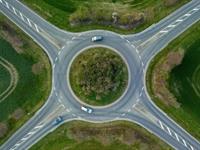
roundabout — [ ˈraʊnd.ə.baʊt] — a place where three or more roads join and traffic must go around a circular area in the middle, rather than straight across; apkārtceļš
At the end of the street, take the second exit at the roundabout to head towards the shopping centre.
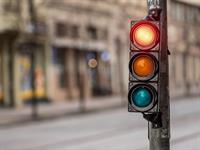
traffic light — [ˈtræf.ɪk ˌlaɪt] — one of a set of red, yellow, and green lights that control the movement of vehicles, usually at a point where two or more roads join; luksofors
After you pass the bakery, stop at the traffic light and then turn left onto Oak Street.
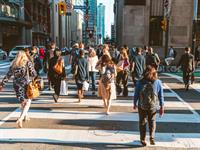
pedestrian crossing — [pəˌdestriən ˈkrɒsɪŋ] — a special place on a road where traffic must stop to allow people to walk across. American English: "crosswalk"; gājēju pāreja
Walk straight ahead until you reach the pedestrian crossing, then cross the street and the café will be on your right.
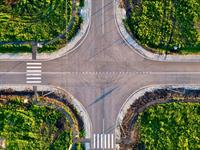
crossroads — [ˈkrɒs.rəʊdz] — a place where two roads meet and cross each other; ceļu krustojums
At the crossroads of Maple Street and Oak Avenue, turn left, and the bank will be on your right.
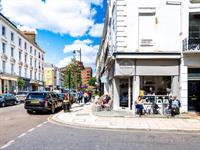
corner — [ˈkɔː.nər] — the point, area, or line that is formed by the meeting of two lines, surfaces, roads, etc.; stūris (piemēram, ēkas)
Go straight on Main Street until you reach the corner of Elm Avenue, then turn right.
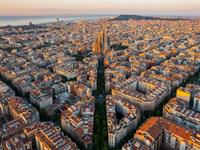
block — [blɒk] — the distance along a street from where one road crosses it to the place where the next road crosses it, or one part of a street like this, especially in a town or city; kvartāls
The museum is just six blocks away.
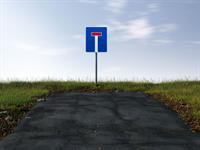
dead end — [ded ˈend] — a road that is closed at one end, and does not lead anywhere; strupceļš
After navigating the crowded city streets, they turned a corner only to find themselves at a dead end, facing a brick wall with no way forward.
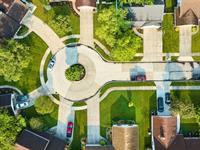
cul-de-sac — [kʌl.də.sæk] — a reasonably short street with a bulbous end; īsa iela, kas beidzas ar apļveida laukumu
The kids loved playing safely in the quiet cul-de-sac at the end of our street.
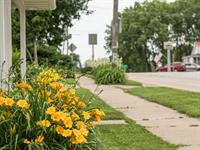
pavement — [ˈpeɪv.mənt] — a path with a hard surface on one or both sides of a road, that people walk on. American English: “sidewalk”; gājēju celiņš
Children should always stay on the pavement when walking to and from school.
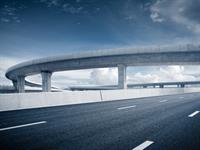
overpass — [ˈəʊ.və.pɑːs] — a bridge that carries a road or railway over another road; ceļa pārvads, gaisa tilts
We drove under the overpass as the train rumbled across it overhead.
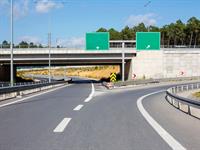
exit (road) — [ˈek.sɪt] — a smaller road used to leave a main road; nobrauktuve
Take the next exit to reach the downtown area.
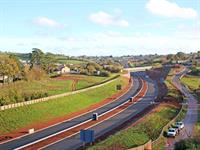
bypass — [ˈbaɪ.pɑːs] — a road built around a town or village so that traffic does not need to travel through it; apvedceļš
We took the bypass to avoid heavy traffic through the city center.
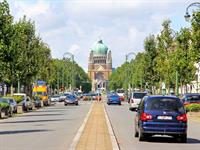
boulevard — [ˈbuː.lə.vɑːd] — a wide road in a city, usually with trees on each side or along the centre; bulvāris
The boulevard is lined with tall palm trees and bustling cafes on both sides.
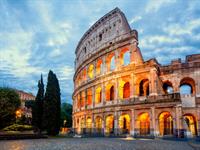
landmark — [ˈlænd.mɑːk] — a building or place that is easily recognized, especially one that you can use to judge where you are; labi zināms objekts, vēsturiska vieta
The Colosseum, located in Rome, Italy, is an ancient amphitheater and one of the most iconic landmarks of the Roman Empire.
Let’s learn: sometimes you might hear people using words like “east”, “west”, “north”, and “south” — four cardinal directions, or cardinal points. These are the four main directions: north, south, east, and west, commonly denoted by their initials N, S, E, and W respectively. Watch the video and learn more:
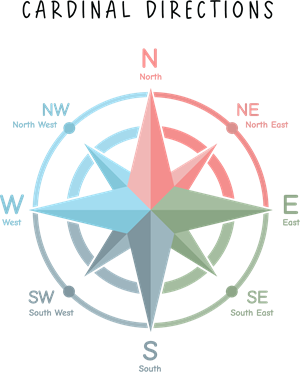
Word bank:
east — [iːst] — the direction from which the sun rises in the morning, opposite to the west, or the part of an area or country that is in this direction; austrumi
Head east towards the beach, and you’ll find the best taco truck parked right by the boardwalk.
west — [west] — the direction in which the sun goes down in the evening, opposite to the east, or the part of an area or country that is in this direction; rietumi
Drive west towards the mountains, and you’ll discover the ultimate hiking trail with breathtaking views!
north — [nɔːθ] — the direction that goes towards the part of the earth above the equator, opposite to the south, or the part of an area or country that is in this direction; ziemeļi
Travel north towards the old clock tower, and you’ll find the ultimate skate park where everyone hangs out.
south — [saʊθ] — the direction that goes towards the part of the earth below the equator, opposite to the north, or the part of an area or country that is in this direction; dienvidi
Go south on Elm Avenue until you spot the bright graffiti wall—right there is where the best late-night food trucks park.
Svarīgi!
Pay attention!
The directions north, east, south, and west should not be given capital letters unless they form a part of a proper noun.
For example:
1. Head north if you want to reach countries like Finland and Sweden. (Here "north" is used to give directions.)
2. There are no penguins at the North Pole. (Here "north" is a part of a proper noun.)
The geographical areas "The North," "The East," "The South," and "The West" are treated like proper nouns. They are written with capital letters. For example:
I live in The North.
I live in The North.
To sum it all up:
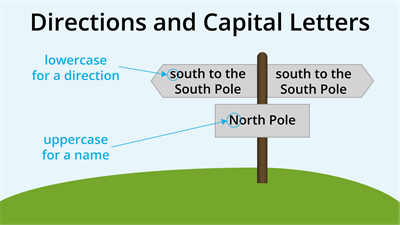
Atsauce:
Picture "Streetmin London" - Andriy Blokhin / Shutterstockcom
Picture "Brussels" - Art Konovalov / Shutterstock.com
Picture "Brussels" - Art Konovalov / Shutterstock.com